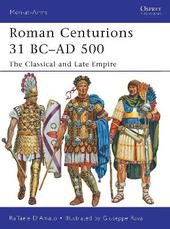
|
Roman Centurions 31 BC-AD 500: The Classical and Late Empire
Paperback / softback
Main Details
| Title |
Roman Centurions 31 BC-AD 500: The Classical and Late Empire
|
| Authors and Contributors |
By (author) Raffaele D'Amato
|
|
Illustrated by Giuseppe Rava
|
| Series | Men-at-Arms |
|---|
| Physical Properties |
| Format:Paperback / softback | | Pages:48 | | Dimensions(mm): Height 248,Width 184 |
|
| Category/Genre | Military history |
|---|
| ISBN/Barcode |
9781849087957
|
| Classifications | Dewey:355.140937 |
|---|
| Audience | | General | | Professional & Vocational | |
|---|
| Illustrations |
40 b/w; 8 col
|
|
Publishing Details |
| Publisher |
Bloomsbury Publishing PLC
|
| Imprint |
Osprey Publishing
|
| Publication Date |
20 February 2012 |
| Publication Country |
United Kingdom
|
Description
In the years between 31 BC and AD 500 the Romans carved out a mighty empire stretching from Britain to the deserts of North Africa. The men who spearheaded this expansion were the centurions, the tough, professional warriors who led from the front, exerted savage discipline and provided a role model for the legionaries under their command. This book, the second volume of a two-part study, reveals the appearance, weaponry, role and impact of these legendary soldiers during the five centuries that saw the Roman Empire reach its greatest geographical extent under Trajan and Hadrian, only to experience a long decline in the West in the face of sustained pressure from its 'barbarian' neighbours. Featuring spectacular full-colour artwork, written by an authority on the army of the Caesars and informed by a wide range of sculptural, written and pictorial evidence from right across the Roman world, this book overturns established wisdom and sheds new light on Rome's most famous soldiers during the best-known era in its history.
Author Biography
Dr Raffaele D'Amato is an experienced Turin-based researcher of the ancient world. He is an external professor to the Athens University School of Philosophy and Material Culture. This is his second book for Osprey.
Reviews"...written by an authority on the era and offers a range of new approaches to the appearance and role of the early centurions. Any early military history collection needs this." --James A. Cox, The Midwest Book Review (August 2012)
|